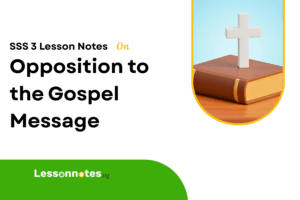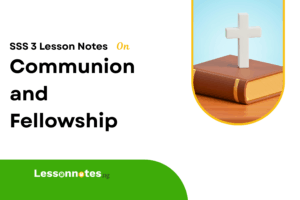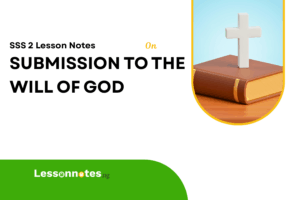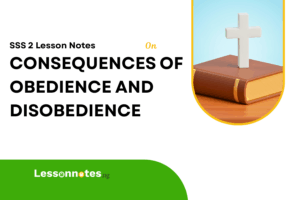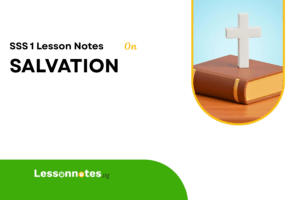The Holy Spirit at Pentecost SS3 Christian Religious Studies (CRS) Lesson Note
Download Lesson NoteTopic: The Holy Spirit at Pentecost
PROMISE OF THE HOLY SPIRIT. ACTS 1: 8.
The Holy Spirit is referred to as God the Spirit. He is the third personality in the trinity of the Godhead. The Holy Spirit is also called the counsellor, comforter, instructor and teacher that directs the affairs of the Church. The Greek name for the Holy Spirit is paraclete.
Jesus made several appearances to His disciples within forty days after His resurrection. It was during this period He gave His disciples the great commission to evangelise the whole world by teaching and preaching to the people and baptising them in the name of the Father, Son and Holy Spirit.
Jesus instructed his disciples to remain in Jerusalem until they receive the power from above which is the Holy Spirit which the Father will send unto them. He said, John the Bap st bap zed with water but in a few days me they would be bap zed with Holy Spirit:
“John bap zed you with water, but before many days you shall be bap zed with the Holy Spirit. ”
Jesus assured them that when the Holy Spirit comes, He will guide them into all truth.
IMPORTANCE OF THE HOLY SPIRIT
- It enables one to work effectively for God.
- The Holy Spirit gives wisdom to understand the gospel message.
- The Holy Spirit gives spiritual courage to preach and win souls for God.
THE COMING OF THE HOLY SPIRIT. ACTS 2: 13
One of the Jewish festivals was the Pentecost, also called the Feast of Weeks. The Pentecost was an agricultural festival held seven weeks or on the fiftieth day (50th day) after the Passover to thank God for a successful agricultural year and to seek His protection and blessing for the next agricultural year. Many Jews came from far and near to celebrate the festival in Jerusalem. Whit-Sunday is the Christian festival corresponding to the Pentecost of the Jews.
Before the coming of the Holy Spirit, while they were praying and waiting for the promise, Peter rose one day and addressed the disciples numbering about one hundred and twenty, in the name of the successor of Judas Iscariot. The qualification was personal knowledge of Jesus and His ministry. Joseph called Barsabbas and Matthias was picked. After prayer and casting of lots, Mathias was chosen to complete the twelve disciples/ Apostles.
The coming of the Holy Spirit took place on the day of Pentecost. This was ten days after the ascension of Jesus into heaven. On this particular day, the disciples were together in the upper room where they had eaten the last supper with Jesus. They had remained in the room after the ascension of Jesus for fear of the Jews.
They prayed and worshipped together in the upper room. Suddenly there was first the sound of a great wind which came from heaven into the room. Then, they saw what looked like flames in the form of tongues resting upon each of them. They were immediately filled with the Holy Spirit and began to speak in an unknown tongue i.e. they began to speak in different languages the goodness of God.
The people around there who had come for the feast of Pentecost heard the noise, they rushed to see what was happening and discovered that the disciples were speaking and preaching about God because each of them heard the disciples preach in his language.
There were Parthian, Medes, Elamites and residents of Mesopotamia, Judea, Cappadocia, Pontus, Asia, Phrygia, Pamphilia, Egypt and parts of Libya belonging to Cyrene. There were also visitors from Rome, Create and Arabia. They were all amazed at the wonderful event but some mocked and made jest of the disciples accusing them of being drunk.
PETER’S SPEECH ACTS 2: 14-41
On hearing the false accusation that the disciples who were under the influence of the Holy Spirit were drunk, Peter stood up to refute the charge of drunkenness. This led to his first speech on the day of Pentecost.
Peter told his hearers that it was unlikely that they would be drunk at the third hour of the day, that is, 9.00 am. He made references to the Old Testament to prove that Jesus of Nazareth was the Messiah. He quoted Prophet Joel 2:28 to show that they were not under the influence of the Holy Spirit.
He cited the miracles, the crucifixion and the death of Jesus as proofs of His Messiahship. He said God raised Him from the death as David had prophesied in the Psalm 16:10:
“For thou wilt not abandon my soul to Hades, nor let thy Holy One see corruption.”
Peter went further to say that Jesus had not only risen but had ascended into heaven. In heaven, He has received from the Father the promise of the Holy Spirit, and from heaven. He has sent the Holy Spirit to His disciples.
He concluded by telling them that this outpouring of the Holy Spirit, manifested by the gift of tongues, was proof that God had made the crucified Jesus both Lord and Christ.
EFFECT OF PETER’S FIRST SPEECH
The people were deeply touched by Peter’s speech. They found themselves guilty of blindness for not recognizing Jesus as Christ. They accepted their responsibility for persecuting Him as a false Christ and admitted their guilt for crucifying Him.
After they had condemned themselves as guilty, they asked, “Brethren, what shall we do?” Peter told them to repent and be baptised in the name of Jesus for the forgiveness of their sins, and they would receive the gi of the Holy Spirit (Acts 2:37-38). They did as Peter said and about three thousand converts were made after Peter’s speech.
EFFECTS OF THE HOLY SPIRIT TODAY
The Holy Spirit ll works today as in the days of the Apostles. Christians speak in tongues, prophesy, see visions, have revelations, preach with boldness, and perform signs and miracles. Christians today can function very well as Pastors, Evangelists, Missionaries, Teachers and Prophets through the power of the Holy Spirit.
SIGNIFICANCE OF THE COMING OF THE HOLY SPIRIT
God fulfilled His promise by sending down the Holy Spirit on the Disciples/Apostles on the day of Pentecost. This shows how reliable, dependable and trustworthy God is in His dealings with human beings. He never fails in His promise


